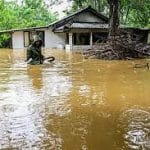ISLAMABAD, Sep 02 (APP): Leading experts, policymakers, and civil society actors have raised the alarm over Pakistan’s deepening deforestation crisis, particularly in Khyber Pakhtunkhwa (KP), and its direct link to climate insecurity demanding legal, policy and governance reforms to reverse the ecological loss.
The national consultation titled “From Challenges to Action: Safeguarding Pakistan’s Natural Wealth for Climate Security and Sustainable Prosperity” was jointly hosted here by the Sustainable Development Policy Institute (SDPI) and the Sustainable Conservation Network (SCN), said a press release issued here on Tuesday.
Chairman of SDPI’s Board of Governors and former diplomat, Ambassador Shafqat Kakakhel, opened the consultation by warning of the increasingly catastrophic impacts of climate change in Pakistan, especially the recurrent and devastating floods that have plagued the country since 2010.
He stressed that there is a direct correlation between the declining forest cover and the worsening flood impacts, particularly pointing to the alarming depletion of forest reserves in KP, which, he warned, is pushing the province’s fragile ecosystem to the brink of collapse.
In his keynote, Dr. Tariq Banuri, former Chairman of the Higher Education Commission and founding Executive Director of SDPI, reflected on how deforestation has remained a persistent and unresolved challenge despite three decades of national and provincial interventions. “We are still grappling with the same problems we raised when SDPI was first established,” Banuri said. “The failure lies not in legislation but in institutional weakness. Forest departments lack autonomy and professional integrity, and unless these institutions are protected and strengthened, no law will be effective.”
In his special address, Shahid Zaman, Secretary of the KP Forests and Wildlife Department, acknowledged the recent environmental destruction caused by weeks of torrential rains and floods. He linked this devastation to unchecked habitat loss and environmental degradation in upstream watershed areas. Zaman stressed the need for a “whole-of-society” approach to meet the challenge, warning that erratic weather patterns will continue to disrupt agriculture and food security
Zaman highlighted several key government-led initiatives, including the Billion Tree Tsunami (2014) and the ongoing Ten Billion Tree Tsunami/Green Pakistan Upscale project. He said that while these programs have had successes, there is now a greater focus on managing standing forests, ensuring community-based range management, and monitoring timber harvesting with transparency and accountability. According to Zaman, 30 percent of KP’s remaining forest cover is under intense pressure from illegal logging operations, and steps have been taken to hold forest officers accountable.
“We have political backing, civil society support, and the endorsement of the Chief Minister of KP,” Zaman said. He added that firefighting equipment and modern monitoring technology have been introduced, ecological sensitive areas are being declared, and Rs 5.4 billion has been allocated for land procurement to develop wetlands, particularly in KP’s southern districts. He also confirmed that agricultural land conversions for commercial use have now been banned in the province.
Muhammad Rafiq, former Country Director of the International Union for Conservation of Nature (IUCN), argued that forest cover in Pakistan is not increasing, as some official narratives claim. Referring to data from the World Bank, FAO, and Global Forest Watch, Rafiq revealed that Pakistan continues to lose its green cover, with Sindh alone having lost 75 percent of its forested areas as reported to the Supreme Court in 2017.
Former WAPDA Chairman and governance expert Shakeel Durrani emphasized the failure of government systems to function during natural disasters. He cited the floods in Buner, Mingora, and Kalam as examples where no district management system operated effectively. Durrani criticized the absence of land-use regulations, noting that agricultural and forest lands have been taken over by housing schemes. He called for the creation of a land-use regulatory authority and enforcement of existing laws like the KP Protection of Rivers Act, 2002, which has seen no convictions to date.
Dr. Adil Zareef, Convener of the Sustainable Conservation Network, noted that KP had once taken a pioneering role in conservation efforts through the establishment of the Serhad Conservation Network in 2001.
Dr. Saima Hashim, Climate and Water Specialist warned of the risks posed by financial mismanagement in climate initiatives. “We must guard against elite capture and weak institutional capacity,” she said, calling for stronger inclusion of women as forest stewards and aligning forest, finance, and gender policies.
Legal expert Advocate Ali Gohar Durrani noted that while environmental tribunals were inspired by India’s legal framework and established in Lahore and Peshawar, they currently lack legal support following the 26th Constitutional Amendment.
MNA Awais Haider Jhakhar, a member of the National Assembly’s Climate Change Committee, highlighted the regional dimensions of climate change, noting that Pakistan is already 1.5°C warmer than the global average. He warned that glacier melt is accelerating at an alarming rate and proposed adopting Bangladesh’s solar microgrid model, which has cut emissions and enabled cross-border energy trade. He also advocated for nationwide campaigns to reduce fossil fuel use and promote electric vehicles and hydrogen energy.
Another parliamentarian, Dr. Shazia Sobia Aslam Soomro, criticized the lack of implementation of forest-related legislation. She reported that the most severe reports of timber mafia activities come from KP, AJK, and GB. Despite summoning officials from these regions, she noted that none appeared before the parliamentary climate committee. “Laws alone are not enough,” she said. “We need a whole-of-society approach for enforcement.”
Dr. Syed Mehmood Nasir, former Inspector General of Forests at the Ministry of Climate Change urged the use of platforms such as the Council of Common Interests and Parliament for coordinated legislation, and cited India’s forest revival efforts as a possible model for reform.
In his concluding remarks, Dr. Banuri reiterated that a professional, independent, and autonomous forest department is critical. “A performing system is one built on institutional autonomy,” he said. “We must protect tenure, service structure, and leadership within the department. Without institutional reform, no legal amendment will deliver results.”
Follow the PNI Facebook page for the latest news and updates.









